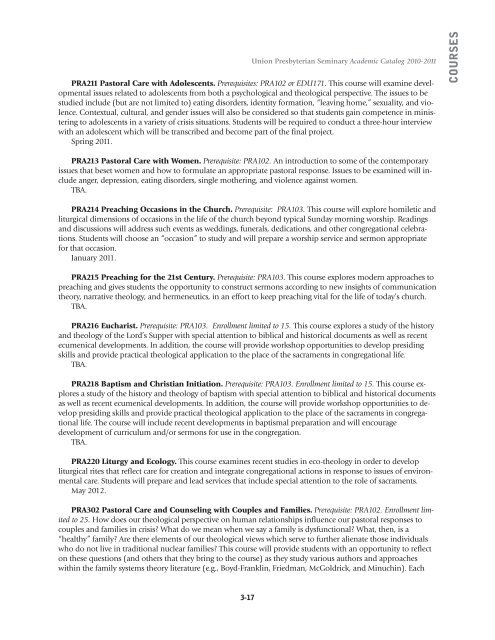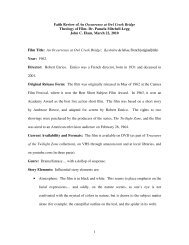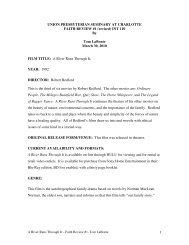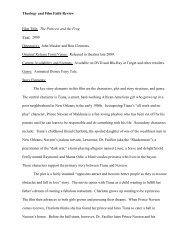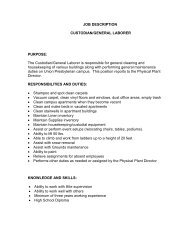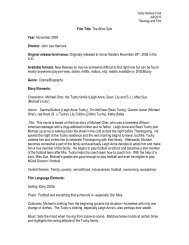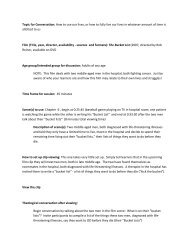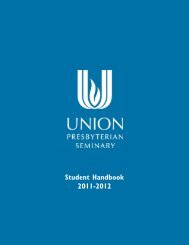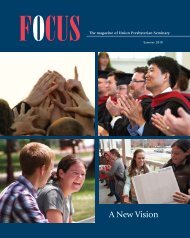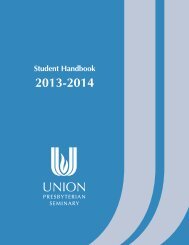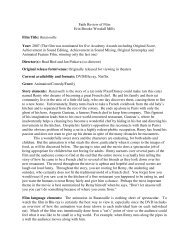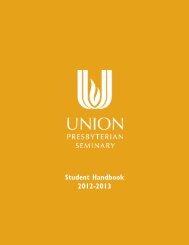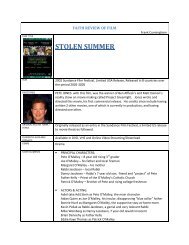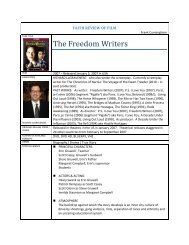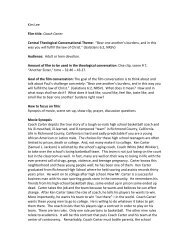Academic Catalog 2010-2011 - Union Presbyterian Seminary
Academic Catalog 2010-2011 - Union Presbyterian Seminary
Academic Catalog 2010-2011 - Union Presbyterian Seminary
Create successful ePaper yourself
Turn your PDF publications into a flip-book with our unique Google optimized e-Paper software.
<strong>Union</strong> <strong>Presbyterian</strong> <strong>Seminary</strong> <strong>Academic</strong> <strong>Catalog</strong> <strong>2010</strong>-<strong>2011</strong>PRA211 Pastoral Care with Adolescents. Prerequisites: PRA102 or EDU171. This course will examine developmentalissues related to adolescents from both a psychological and theological perspective. The issues to bestudied include (but are not limited to) eating disorders, identity formation, “leaving home,” sexuality, and violence.Contextual, cultural, and gender issues will also be considered so that students gain competence in ministeringto adolescents in a variety of crisis situations. Students will be required to conduct a three-hour interviewwith an adolescent which will be transcribed and become part of the final project.Spring <strong>2011</strong>.COURSESPRA213 Pastoral Care with Women. Prerequisite: PRA102. An introduction to some of the contemporaryissues that beset women and how to formulate an appropriate pastoral response. Issues to be examined will includeanger, depression, eating disorders, single mothering, and violence against women.TBA.PRA214 Preaching Occasions in the Church. Prerequisite: PRA103. This course will explore homiletic andliturgical dimensions of occasions in the life of the church beyond typical Sunday morning worship. Readingsand discussions will address such events as weddings, funerals, dedications, and other congregational celebrations.Students will choose an “occasion” to study and will prepare a worship service and sermon appropriatefor that occasion.January <strong>2011</strong>.PRA215 Preaching for the 21st Century. Prerequisite: PRA103. This course explores modern approaches topreaching and gives students the opportunity to construct sermons according to new insights of communicationtheory, narrative theology, and hermeneutics, in an effort to keep preaching vital for the life of today’s church.TBA.PRA216 Eucharist. Prerequisite: PRA103. Enrollment limited to 15. This course explores a study of the historyand theology of the Lord’s Supper with special attention to biblical and historical documents as well as recentecumenical developments. In addition, the course will provide workshop opportunities to develop presidingskills and provide practical theological application to the place of the sacraments in congregational life.TBA.PRA218 Baptism and Christian Initiation. Prerequisite: PRA103. Enrollment limited to 15. This course exploresa study of the history and theology of baptism with special attention to biblical and historical documentsas well as recent ecumenical developments. In addition, the course will provide workshop opportunities to developpresiding skills and provide practical theological application to the place of the sacraments in congregationallife. The course will include recent developments in baptismal preparation and will encouragedevelopment of curriculum and/or sermons for use in the congregation.TBA.PRA220 Liturgy and Ecology. This course examines recent studies in eco-theology in order to developliturgical rites that reflect care for creation and integrate congregational actions in response to issues of environmentalcare. Students will prepare and lead services that include special attention to the role of sacraments.May 2012.PRA302 Pastoral Care and Counseling with Couples and Families. Prerequisite: PRA102. Enrollment limitedto 25. How does our theological perspective on human relationships influence our pastoral responses tocouples and families in crisis? What do we mean when we say a family is dysfunctional? What, then, is a“healthy” family? Are there elements of our theological views which serve to further alienate those individualswho do not live in traditional nuclear families? This course will provide students with an opportunity to reflecton these questions (and others that they bring to the course) as they study various authors and approacheswithin the family systems theory literature (e.g., Boyd-Franklin, Friedman, McGoldrick, and Minuchin). Each3-17


